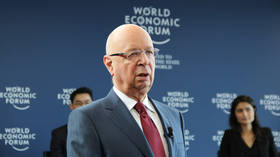Monopoly? What monopoly? Big Tech defends itself from antitrust allegations with denial & doublespeak
Facebook, Google, Amazon and Apple are pushing back against the US government’s antitrust investigations, downplaying their dominance of the tech sector, playing dumb, and staying quiet where they can’t obfuscate.
The Big Tech behemoths responded to written questions sent by the House Judiciary Committee - one of several antitrust probes targeting the four companies - with concerted efforts to tone down their monopolistic image - no easy feat for two trillion-dollar companies and two more that are approaching that figure. Answers were shared with reporters on Tuesday, according to Reuters.
Also on rt.com Google wades into banking even as it faces new federal probe into shady medical data collectionGoogle claimed that because “the vast majority” of clicks generated by a Google search go to websites not owned by Google, its near-complete hold on the search market - as a portal for 90 percent of all internet searches, its name has become a literal synonym for “to search the internet” - left plenty of room for competition. Google denied favoring its own services, such as YouTube, over rivals’ in searches, though one would be hard-pressed to find another video platform’s links under a Google video search.
Google’s massive data advantage in “vertical integration” of its advertising platform may allow it to target ads more precisely, but - the search giant claimed - it takes steps to “level the playing field,” giving its competitors a fair chance. Notably, it did not inform lawmakers of what those steps might be, or how it measured their effect. Last year, Google controlled 76 percent of the search ad market, a figure that was projected to grow to 80 percent this year - not leaving much room for competition.
The committee was unable to obtain much of the Google data it sought, as the megacorp pleaded ignorance of certain requested categories - i.e. claiming it lacked a “standard definition for what searches are considered ‘location searches’” when lawmakers asked to see how many searches displayed information about a business’ location.
Facebook similarly played hard to get, admitting it booted programs from its app developer platform if they mimicked a central function of Facebook and its subsidiaries too exactly, but refusing to be pinned down on this blatantly anti-competitive policy, merely stating that certain apps it removed had “violated its policies” in some unspecified way. Senators Josh Hawley (R-Missouri) and Chris Coons (D-Delaware), unsatisfied with the responses they received, requested more information on how and why the platform might slurp up users’ locations - especially if the users don’t want that data shared.
Also on rt.com Facebook ordered to cough up Zuckerberg emails after stonewalling California privacy probeAmazon, too, let slip a few morsels of anticompetitive behavior - the trillion-dollar corporation asks third-party merchants to lower their prices to undercut competing sites’ prices, something that could eventually drive smaller sellers, who can’t afford to forgo profit by taking part in a price war, out of business. The e-retailing giant admits it uses data aggregated from those merchants for “business purposes” on its own site, but denied weaponizing that data to push its own products into the market.
Tight-lipped Apple shared little by way of juicy details, claiming only two employees had availed themselves of its arbitration option, but hinted it had spent “billions” on its maps app to compete (in vain, it seems) with Google Maps.
The Judiciary Committee launched its antitrust probe in June, joining a handful of already-extant probes into the ‘big four’ tech companies’ seeming dominance of the market in search, social, shopping, and devices. Several politicians have threatened to break up the massive corporations, and it’s not clear - if the investigations do turn up any antitrust violations - how far-reaching the remedies will be.
Like this story? Share it with a friend!














